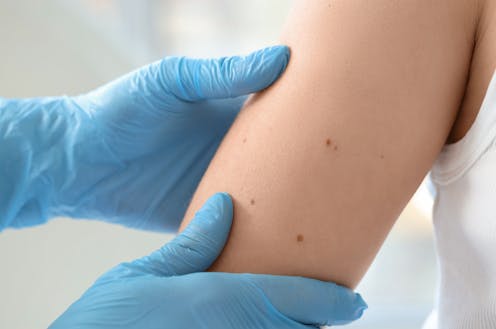We don’t all need regular skin cancer screening – but you can know your risk and check yourself
- Written by The Conversation

Australia has one of the highest skin cancer rates globally, with nearly 19,000 Australians diagnosed with invasive melanoma – the most lethal type of skin cancer – each year.
While advanced melanoma can be fatal, it is highly treatable when detected early.
But Australian clinical practice guidelines and health authorities do not recommend screening for melanoma in the general population.
Given our reputation as the skin cancer capital of the world, why isn’t there a national screening program? Australia currently screens for breast, cervical and bowel cancer and will begin lung cancer screening in 2025.
It turns out the question of whether to screen everyone for melanoma and other skin cancers is complex. Here’s why.
The current approach
On top of the 19,000 invasive melanoma diagnoses each year, around 28,000 people are diagnosed with in-situ melanoma.
In-situ melanoma refers to a very early stage melanoma where the cancerous cells are confined to the outer layer of the skin (the epidermis).
Instead of a blanket screening program, Australia promotes skin protection, skin awareness and regular skin checks (at least annually) for those at high risk.
About one in three Australian adults have had a clinical skin check within the past year.
Why not just do skin checks for everyone?
The goal of screening is to find disease early, before symptoms appear, which helps save lives and reduce morbidity.
But there are a couple of reasons a national screening program is not yet in place.
We need to ask:
1. Does it save lives?
Many researchers would argue this is the goal of universal screening. But while universal skin cancer screening would likely lead to more melanoma diagnoses, this might not necessarily save lives. It could result in indolent (slow-growing) cancers being diagnosed that might have never caused harm. This is known as “overdiagnosis”.
Screening will pick up some cancers people could have safely lived with, if they didn’t know about them. The difficulty is in recognising which cancers are slow-growing and can be safely left alone.
Receiving a diagnosis causes stress and is more likely to lead to additional medical procedures (such as surgeries), which carry their own risks.
2. Is it value for money?
Implementing a nationwide screening program involves significant investment and resources. Its value to the health system would need to be calculated, to ensure this is the best use of resources.
Read more: Yes, you still need to use sunscreen, despite what you’ve heard on TikTok
Narrower targets for better results
Instead of screening everyone, targeting high-risk groups has shown better results. This focuses efforts where they’re needed most. Risk factors for skin cancer include fair skin, red hair, a history of sunburns, many moles and/or a family history.
Research has shown the public would be mostly accepting of a risk-tailored approach to screening for melanoma.
There are moves underway to establish a national targeted skin cancer screening program in Australia, with the government recently pledging $10.3 million to help tackle “the most common cancer in our sunburnt country, skin cancer” by focusing on those at greater risk.
Currently, Australian clinical practice guidelines recommend doctors properly evaluate all patients for their future risk of melanoma.
Looking with new technological eyes
Technological advances are improving the accuracy of skin cancer diagnosis and risk assessment.
For example, researchers are investigating 3D total body skin imaging to monitor changes to spots and moles over time.
Artificial intelligence (AI) algorithms can analyse images of skin lesions, and support doctors’ decision making.
Genetic testing can now identify risk markers for more personalised screening.
And telehealth has made remote consultations possible, increasing access to specialists, particularly in rural areas.
Check yourself – 4 things to look for
Skin cancer can affect all skin types, so it’s a good idea to become familiar with your own skin. The Skin Cancer College Australasia has introduced a guide called SCAN your skin, which tells people to look for skin spots or areas that are:
1. sore (scaly, itchy, bleeding, tender) and don’t heal within six weeks
2. changing in size, shape, colour or texture
3. abnormal for you and look different or feel different, or stand out when compared to your other spots and moles
4. new and have appeared on your skin recently. Any new moles or spots should be checked, especially if you are over 40.
If something seems different, make an appointment with your doctor.
You can self-assess your melanoma risk online via the Melanoma Institute Australia or QIMR Berghofer Medical Research Institute.







